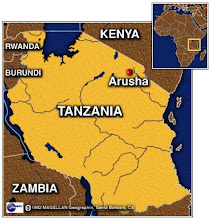From atop the luggage in the back of Gosperth’s land rover, it was hard to tell whether we drove 70 km off the beaten path into Masai territory, or if we just spent 3 hours making sharp turns to hit landmines in the middle of a duststorm. The only living things we saw for the better part of the last hour were herds of goats, men in traditional Masai gear riding motorcycles (to herd the goats?), and the infamous “brown zebra” (donkey).
After lunch, we spent around four hours at the clinic, which Michelle described in full, and went back to the camp. On the walk, we terrified groups of Masai children, who are apparantly told the mzungu eat African children in their sleep. Naturally, we chased them, which made their traditional robes transform into capes flying on otherwise naked children. We then made up for it by playing soccer with a ball made out of plastic bags and passing out toy cars and (sorry, dentists) candy. At our base, rooms were arranged in a mini-hostel format, with an open kitchen (food over coal pits),and a central patio.
Gladness, our hostess, cannot be described accurately with words. She started a business with Masai women to allow them to sell crafts and gain some independent income and runs the hostel when visitors come to Lengast. Gladness spent most of our visit running around camp yelling “goodi goodi” and “food is ready- KARIBU (welcome).” Gladness drank 3 local brews and told us about drinking “the ‘kila” which made her “so warm… first the shirt comes off, then the pants, then I am dancing in the ocean- whoosh!” Gladness taught us to “shake the taco,” and created songs to commemorate most of the simple actions of the evening. She is likely my favorite Tanzanian.
We awoke the next morning and spent the better part of the day in clinic, topping us off at over 250 patients seen. After lunch, we somehow found ourselves with 7 other Tanzanians in the back of a pickup truck, speeding through dust storms on our way to the “biggest mountain in Lengast.” Though the title of “mountain” may have been slightly exaggerated, it did yield the most incredible view and spoke to the absolute isolation of the clinic. Pictures don’t do the view justice; it was breathtaking. Plus, the rocks looked just like the opening scene of the Lion King, which was pretty sweet.
When we got back, we learned that the Masai had, in fact, slaughtered a goat for our arrival. We also learned that they do, in fact, eat ALL of the goat. Meat was leaned over the fire on sticks, and more than one of us was chased around the commons by Gladness and goat testicles on a stick. We all ended up sampling the delicacies.
We spent the better part of the next hour playing with Masai children- taking pictures and showing them the images on digital cameras, dancing, running. They are both endlessly amused with the mzungu and absolutely terrified.
After dinner-fire came Masai courtship dance, during which we all may or may not have become engaged to several eligible Masai bachelors. The men and women line up across from one another. In a call-and-response kind of format, the men and women sing back and forth. One at a time, a girl would run out and shake all the beaded/metal jewelry on herself without really appearing to move her body. She then apparantly touches shoulders with a man and runs back to the crowd. And the process is repeated. Sometimes a man and woman dance in the same fashion in the middle of the crowd. Sometimes the men jump out of line and run at the women’s line. Sometimes the men have what appear to be jumping contests. Sometimes the white mzungu are forced to run to the middle even when they have no idea what is going on.
Somewhere in the midst of dancing and goat-eating, we were given copious amounts of nailpolish remover to drink, which the locals claimed was some kind of homemade Konyagi (Tanzanian moonshine). It was awful and I will say no more.
At breakfast, Gladness handed me a piece of meat and told me “give this to Blian… it is the exhaust end.” At which point I realized she had just handed me goat rectum/anus. Which seems like an appropriate end to the Masai villiage story.
Sunday, July 26, 2009
Subscribe to:
Post Comments (Atom)

No comments:
Post a Comment